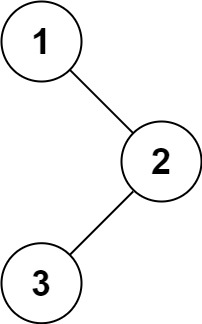LeetCode-in-All
94. Binary Tree Inorder Traversal
Easy
Given the root of a binary tree, return the inorder traversal of its nodes’ values.
Example 1:

Input: root = [1,null,2,3]
Output: [1,3,2]
Example 2:
Input: root = []
Output: []
Example 3:
Input: root = [1]
Output: [1]
Example 4:

Input: root = [1,2]
Output: [2,1]
Example 5:

Input: root = [1,null,2]
Output: [1,2]
Constraints:
- The number of nodes in the tree is in the range
[0, 100]. -100 <= Node.val <= 100
Follow up: Recursive solution is trivial, could you do it iteratively?
Solution
# Definition for a binary tree node.
#
# defmodule TreeNode do
# @type t :: %__MODULE__{
# val: integer,
# left: TreeNode.t() | nil,
# right: TreeNode.t() | nil
# }
# defstruct val: 0, left: nil, right: nil
# end
defmodule Solution do
@spec inorder_traversal(root :: TreeNode.t | nil) :: [integer]
def inorder_traversal(root) do
[]
|> in_walk(root, &[&2 | &1])
|> Enum.reverse()
end
@spec in_walk(acc, nil | TreeNode.t, (acc, val -> acc)) :: acc
when acc: any, val: any
defp in_walk(acc, nil, _fun), do: acc
defp in_walk(acc, node, fun) do
acc
|> in_walk(node.left, fun)
|> fun.(node.val)
|> in_walk(node.right, fun)
end
end

